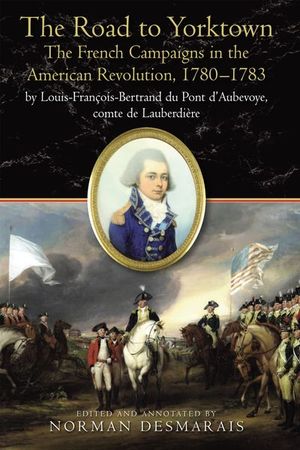The Road to Yorktown
Published by Savas Beatie
The fate of the American Revolution had yet to be decided when a remarkable 21-year-old Frenchman arrived in America. Louis-François-Bertrand, the Count of Lauberdière, belonged to an old noble family that traced its heritage back to the Crusades. His father, François-Charles-Mathieu, was musketeer of the guard of King Louis XV. More important, his uncle was General Rochambeau, the commander of all French forces in America. The Count of Lauberdière kept one of the most remarkable diaries of the entire war, and it is published here for the first time as The Road to Yorktown: The French Campaigns in the American Revolution, 1780-1783, by Louis-François-Bertrand du Pont d’Aubevoye, comte de Lauberdière, translated and edited by Norman Desmarais. Serving as aide-de-camp on General Rochambeau’s staff, the young and well-educated Lauberdière enjoyed a unique perspective of the war. He rubbed shoulders with some of the Revolution’s most important personalities (including George Washington and Lafayette), and was in the epicenter of many of the war’s momentous events. His journal covers a host of topics in remarkable detail, including descriptions of the French army’s camp in Newport, Rhode Island, the long march to Yorktown, the siege, and capture, and a fascinating examination of the people and their distinctive colonial culture. His keen eye and sharp descriptions of the Army’s daily activities and movements provide a wealth of information for inquisitive readers and historians—details found only in this diary. For example, nearly all French diaries mention the army’s arrival and landing at Newport, but only Lauberdière’s identifies exactly where it occurred. Anti-French prejudices were common, and the nephew recorded how Rochambeau dispelled them and won over the locals. Culture fascinated the young Count, who keenly observed how the colonials attempted to imitate European manners and styles, marveling at how Philadelphia adopted Parisian fashions in the brief time between his visits there. He even visited Washington’s home at Mount Vernon and made pointed comments about his wife, Martha. With its expertly crafted footnotes, maps, and illustrations, The Road to Yorktown offers a fresh and invigorating firsthand account that will satisfy even the most demanding student of the American Revolution.
BUY NOW FROM
COMMUNITY REVIEWS

